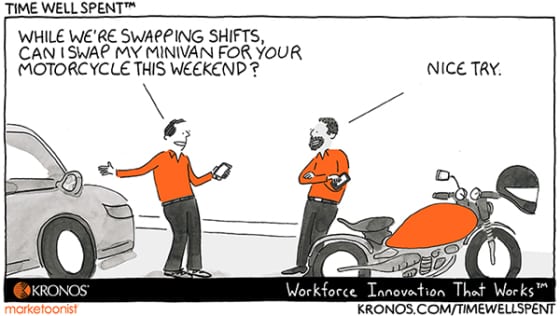Employees Should Establish Their Own Priorities
A couple of months ago, I wrote an article about Kronos’ transition from a traditional time-off policy to an unlimited time-off program (called myTime). On some level, I like to think of the concept of unlimited time off as Paid Time Off 2.0. Decades ago, organizations had vacation, paid sick time, and holidays. Then they decided to merge all these categories together and give employees one balance called Paid Time Off (PTO).
Today, an increasing number of employers are simply saying, “You know your job and what you need to do. Take off when you need to.” IMHO, it sounds very refreshing for employees. They can take off to spend the time with family. Or as this Time Well Spent from our friends at Kronos points out, they can take a couple of days off for some “me” time. Whatever the reason or priorities, the employee gets to decide what’s important to them.
That isn’t to say unlimited time off doesn’t come with some challenges. Chief People Officer David Almeda mentions in a case study on The Workforce Institute blog that managers received training, so they could manage the new program and also rethink their role when it came to employee scheduling. It makes total sense. In a traditional time-off environment, managers had to schedule, monitor, and administer time off. Now, with unlimited time off, they’re more of a facilitator and I’m sure it takes some getting used to.
But it also means that employees have to rethink their requests. In the past, they could ask for time off, and the manager decided whether or not it was approved. Now, employees need to understand what their priorities are. Just because you can take off doesn’t mean you should. As a consultant, this is a lesson I learned very early. For example, when it comes to tasks, there are some things I do during the normal weekday – like grocery shopping – because I can, and it takes a lot less time. But there are things I do on the weekends, like the laundry.
When employees are given the ability to request time off, they have to figure out how to balance their requests with company priorities. Employees still have to get their work done. Kronos has been very open about their program results and that employee requests are not significantly greater under the unlimited time off program. But for companies considering a move to this type of program, it might be worth offering employees some type of training as well, similar to the training that managers received.
Employees want to have the freedom to make their own decisions. But when they’ve never had that ability before, it could take some adjustments.
3